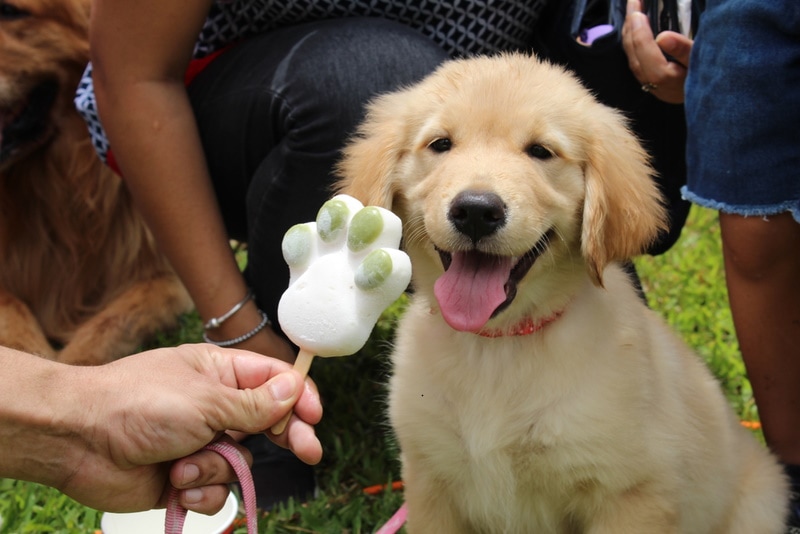
Click to Skip Ahead
When the heat of summer is in full effect, having a delicious scoop of ice cream is the perfect way to cool off. While you’re losing yourself in your sweet treat, don’t be shocked to find your pooch at your side staring up, wanting a lick. As any dog owner knows, our pets want to try all the foods we eat. Even those that aren’t good for them. But where does ice cream fall? Is it good or bad? Can dogs eat ice cream?
Unfortunately, ice cream isn’t the greatest treat for our pets. While a lick of ice cream isn’t considered toxic, it does have a lot of dairy and sugar, both of which aren’t great for your dog. Let’s take a deeper dive into dogs and ice cream so you can better understand why this isn’t the best treat to share with your dog.
Why Dogs Shouldn’t Eat Ice Cream
While your dog snatching a lick or two of your ice cream isn’t the end of the world most of the time, this treat isn’t great for your pooch. The big question is why. Below, we’ll take a look at the reasons, so you can better understand your dog’s relationship with your favorite summer treat.
Lactose Intolerance
As young pups, our pets survive on the milk their mothers provide. Older dogs, however, can’t digest milk as easily. You may be curious as to why that is. Lactase, an enzyme puppies use to digest their mother’s milk, is produced less once the puppy is weaned. Lactase is also needed to digest lactose that is found in the dairy milk used to make most ice creams. Failure to be able to digest lactose results in lactose intolerance.
Adult dogs can suffer from lactose intolerance, and many of them do, to a certain degree. This makes it more difficult for them to digest milk and can cause mild to severe gastrointestinal issues like bloating, gas, discomfort and diarrhea, when they have milk or products made with milk.

Sugar and Fat
Most ice creams contain quite a bit of sugar. Anything with high levels of sugar isn’t good for your pet. Dogs that eat a lot of sugar can deal with weight issues or obesity, which can make a significant impact on their health and quality of life.
Foods that are high in fat can also be dangerous for your dog. Foods that are high in fat can help contribute to obesity, and can also cause pancreatitis in dogs, which is a painful, life-threatening illness.
Food Allergies
Food allergies can occur at any point in a dog’s life. Ice cream can be a source of these allergies thanks to the proteins found in milk, or any other flavors that might be included. Dogs can experience diarrhea, vomiting, and itchy rashes when they experience food allergies. Severe allergies can be quite dangerous and affect your dog’s breathing, leading to an emergency trip to the veterinarian.
Toxic Ingredients
We mentioned that a lick or two of strawberry or vanilla ice cream isn’t toxic for dogs, however, there are ice creams out there that can be. Ice cream that has chocolate or caffeine in it can be extremely dangerous for your canine pal as these ingredients are harmful to them. Rum and raisin is another flavor to be avoided at all costs, as grapes and raisins are highly toxic to dogs. You must also be extremely cautious about xylitol, an artificial sweetener that can be found in sugar-free ice creams. This ingredient is highly toxic to dogs as well.

What Do I Do If My Dog Eats Ice Cream?
If your dog accidentally gets into a bit of ice cream, don’t panic. If the ice cream wasn’t sugar-free and didn’t have chocolate or caffeine in it, your pet should be fine. However, to be on the safe side, check the ingredients list of the ice cream to make sure your dog is safe. If the ice cream had any unsafe ingredients inside, carefully monitor your dog for signs of distress like diarrhea or vomiting. If you see anything concerning, call or take them to the veterinarian immediately.
If they have eaten a large amount of ice cream (bearing in mind that a small amount can be a large amount for a tiny dog), you should contact your vet for advice.
Is Dog Ice Cream a Safe Alternative?
If you’ve been in your local store and saw dog ice cream, don’t hesitate to let your dog give it a try. Dog ice cream is not traditional ice cream. It uses safe ingredients that mimic the taste and texture of human ice cream. It is created specifically for dogs, and doesn’t have dangerous ingredients inside. It also comes in flavors that most dogs love, including peanut butter, banana, and pumpkin.You can even have a go at making your own. It is still a treat, however, and treats should only make up around 10% of your dog’s overall diet.
Here’s a hot tip from our vets: if you have a dog that is difficult to give medication to, doggy ice cream is a great option to try hiding tablets in!

Final Thoughts
While plain vanilla or strawberry ice cream isn’t considered toxic for your dog, it’s still best to avoid allowing them this summer treat. A lick here or there shouldn’t cause an issue, but the sugar and fat inside ice cream, along with a dog’s natural issue with digesting dairy products, means this sweet summer treat should stay on your menu, not your pup’s. Instead, offer them a bit of doggy ice cream to beat the heat this summer.
See also:
Featured Image Credit: Elena Veselova, Shutterstock






